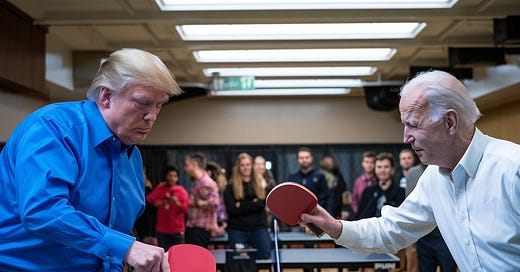During his first term, Donald Trump signed 220 executive orders. 72 of those were reversed during Joe Biden's term, many by executive order. In his first week-plus of his second term, Trump signed several dozen executive orders, many of them reversing or undoing Biden executive orders.
Is this any way for a nation to run?
Pundits of the Left cautioned us against an "imperial Presidency" during George W. Bush's tenure. Barack Obama promised to pull back from the executive overreach that prompted such concerns, but the moment things didn't go his way, he gave us his infamous "pen and phone" warning. When Trump took office in 2017:
Trump signed 24 executive orders in his first 100 days. He signed 22 presidential memoranda, 20 presidential proclamations, and 28 bills. About a dozen of those bills roll-back regulations finalized during the last months of his immediate predecessor Barack Obama's presidency using the Congressional Review Act.
Not all executive orders are equal. Many are simply guidance associated with the proper duty of the Executive Branch, i.e. to put into effect the laws enacted by Congress. Others, however, stray far into the realm of legislation, and often rely on vague or excessively broad delegation of power by Congress to the Presidency. They are, for all intents and purposes, legislation, not execution.
This brings us to the crux of the problem:
Congress.
The legislative branch has descended into dysfunction. It runs the country by passing giant omnibus bills whose contents are unknown to anyone but the bureaucrats and lobbyists that write them, and by mad scrambles to avert government shutdowns whenever the last 'continuing' bill runs out or the debt ceiling gets approached. Congress hasn't passed an on-time budget since 1996. That's nearly thirty years, and harkens back to when Bill Clinton was President, Newt Gingrich was House Speaker, Bob Dole was Senate Majority Leader, and the GOP had comfortable majorities in both Houses. Some may recall the historic shellacking that the voters delivered to the Democrats in 1994, a shellacking that saw the Dems lose 11 Senate seats, 63 House seats, and prompted Clinton to morph from textbook liberal to successful moderate.
Briefly, we had some functional government.
Briefly.
Now, Congress has mostly abandoned its role as writer of laws. To unnamed and unelected back-office types, to the lobbyists and rent-seekers that share beds with them, and to the increasingly powerful Executive Branch headed by the President and staffed by a mix of his minions and (often-recalcitrant and agenda-driven) lifers.
Some in the GOP are aware that what can be done by EO can generally be undone by EO. Not always - there are some rather byzantine "traps" that prevent undoing in some cases. As we all should know, government loves to make itself bigger and hates to make itself smaller. But, those aside, many things done by a President are only as permanent as his term. So, already, GOP leadership speaks of codifying Trump's executive orders into law.
Whether or not you or I agree with a particular EO, we should feel good about them being addressed by the legislative process, about the system starting to work again. Only time will tell if that actually happens, and the cynic in me isn't that optimistic.
If you're on the Left, you may fear or lament such an outcome, but keep in mind - the pendulum always swings, and the day will come when the Democrats are back in power. If Congress rediscovers its purpose, then some things important to you might get past Executive Ping Pong status.
A footnote, because the gnashing of teeth has reached fever pitch. The abortion issue remains high on the Democratic panic hierarchy because Harris lost, no matter that Trump has voiced every intent to leave it to the states as per the Dobbs decision. This could be deemed the Democrats' own fault, and not because of the whole Biden-Harris debacle. They had 60 years to codify Roe v Wade, including two separate stretches when they had the Presidency, the House, and a filibuster-proof Senate supermajority: 1977-79 and 2009. But, this assumes that every Democrat in those Congresses was pro-choice, and there's ample reason to believe that several would not have voted with their party on such a bill.
As a side note, the last time the GOP had a Senate supermajority was 150 years ago.
Which tells us that the abortion matter is going to remain a political football, and that it will in all likelihood be codified state-by-state. Don't think that this makes politicians, especially those on the Left, sad. The controversy helps fill their campaign coffers.





Excellent article. I was thinking of penning something along those lines, but you beat me to it. But, I must ask: where did you get that ping-pong photo? Did you just search and download it, or did you "compose" it?
No more checks and balances. It reminds me of Geeece everytime a new political party comes into power.